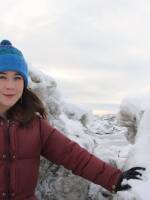Wildlife managers say that warmer weather has made it harder for hunters to participate in the winter moose hunt and to hunt caribou on the Nushagak Peninsula.
Warmer weather in the last few weeks has kept area hunters from taking many moose or caribou according to wildlife managers. KDLG's Avery Lill has more.
Audio Transcript:
Neil Barten is the wildlife biologist for Alaska Department of Fish & Game in Dillingham. In early December he was concerned that a low bull-to-cow ratio in in area 17C, would necessitate closing the winter moose hunting season early.
Half way through the season, he says that is no longer under consideration for this game management unit in the middle of western Bristol Bay.
“As far as the winter hunt in 17 B and C, as of this morning I only see that we have eight moose reported,” says Barten. “Given the conditions, I’m not so concerned about this big on slot of a quick harvest, so I think we’ll just let the season run its course to the end of December and see what we end up with. So at this point it looks like we might get a little more snow here in the next few days or week. And maybe people can get out a little more and see how it works out.”
Area 17A north of Twin Hills and Togiak is also allowed a 30 day season, but the start date depends on conditions.
“Now we’re still waiting to hear from the advisory committee over in Togiak as to when they want to open the 17A hunt,” Barten says. “We had a discussion last week, and they’re still kind of waiting on better weather for traveling. So when that happens, we’ll issue an emergency orders to open that season.”
Another meat hunting option in western Bristol Bay is the Nushagak Peninsula Caribou herd, which has been hard to reach and under-hunted for several years. Andy Aderman, a wildlife biologist at the Togiak National Wildlife Refuge, is hoping winter travel conditions will improve and allow more access.
“The Nushagak Peninsula herd has gotten fairly large and we’ve been trying to reduce it for the last several years. So far this year I know of 39 that have been harvested. And that’s—we’d like to see several hundred if not more than that harvested just to bring that herd down hopefully in the range of 700 to 800.”
Rules for hunting the Nushagak Peninsula herd have been liberalized to encourage more harvest. Starting January 1, same-day airborne hunting will be allowed. Hunters will still need to be at least 300 feet from their aircraft before they attempt to take a caribou. For the federal hunt, the harvest limit was raised to five. October and November was added to make the hunt longer.
The Nushagak Peninsula herd has grown to over 1200 animals and Aderman is concerned that the population is at risk of crashing to much smaller numbers when it eats the available food and starves.
“That’s part of the natural scheme it seems with caribou herds is they build up, and then they crash, and then they build up, and we’d like to take some of that variability out of it if we could.”
The National Weather Forecast shows possible snow most days this coming week and colder temperatures than last week. So conditions for hunting may be improving. Aderman reminds hunters that they will need a 2017 license to continue hunting in January.
Contact the author: avery@kdlg.org



